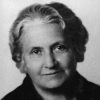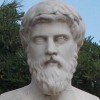They loved their wives, and were beloved by them. Their entire attention was directed to educating their children in the ways of virtue; the miseries of their fellow countrymen were constantly represented to them and held up as the sorriest of examples. Above all, they were taught that individual interest is always bound to the common interest, that to try to separate them was to invite ruin, that virtue is not something costly to achieve nor painful to exercise, and that justice for others is a blessing for ourselves.
They soon had the consolation of virtuous fathers, seeing their children develop in their image.[Ils aimoient leurs femmes, et ils en étoient tendrement chéris. Toute leur attention étoit d’élever leurs enfants à la vertu. Ils leur représentoient sans cesse les malheurs de leurs compatriotes, et leur mettoient devant les yeux cet exemple si touchant ; ils leur faisoient surtout sentir que l’intérêt des particuliers se trouve toujours dans l’intérêt commun ; que vouloir s’en séparer, c’est vouloir se perdre ; que la vertu n’est point une chose qui doive nous coûter ; qu’il ne faut point la regarder comme un exercice pénible ; et que la justice pour autrui est une charité pour nous.
Ils eurent bientôt la consolation des pères vertueux, qui est d’avoir des enfants qui leur ressemblent.]Charles-Lewis de Secondat, Baron de Montesquieu (1689-1755) French political philosopher
Persian Letters [Lettres Persanes], Letter 12, Usbek to Mirza (1721) [tr. Healy (1964)]
(Source)
In the story of the Troglodytes, a tribe who had been decimated by a plague after years of self-interested anarchy where every person did as they wished. The survivors developed a philosophy of mutual aid and community, and prospered.
(Source (French)). Alternate translations:
They lov'd their Wives, and were tenderly belov'd by them. They were wholly intent upon educating their Children to Virtue. They continually represented to them the Calamities of their Countrymen, and often set that moving Example before their Eyes. They above all things instill'd into them this Principle, that every private Man's Interest is inseparable from the Interest of the Community. To divide it, is Ruin. That Virtue is not a thing which should be troublesome to us, nor ought the Exercise of it to give us pain; and that Justice to another, is Charity to our selves.
They had soon the Consolation of virtuous Fathers; which is, to have Children like themselves.
[tr. Ozell (1736)]
They loved their wives, and were affectionately beloved by them. The training up their children to virtue engaged their utmost care. They continually represented to them the miseries of their countrymen, and placed their melancholy example before their eyes. They especially inculcated upon their minds, that the interests of individuals was always to be found in that of the community, and that to attempt to seek it separately was to destroy it; that virtue is by no means a thing that ought to be burdensome to us, nor the practice of it considered as painful; that doing justice to others is acting charitably to ourselves. They soon enjoyed the consolation of virtuous parents, which consists in having children like themselves.
[tr. Floyd (1762)]
They loved their wives, and were beloved most tenderly. Their utmost care was given to the virtuous training of their children. They kept before their young minds the misfortunes of their countrymen, and held them up as a most melancholy example. Above all, they led them to see that the interest of the individual was bound up in that of the community; that to isolate oneself was to court ruin; that the cost of virtue should never be counted, nor the practice of it regarded as troublesome; and that in acting justly by others, we bestow blessings on ourselves.
They soon enjoyed the reward of virtuous parents, which consists in having children like themselves.
[tr. Davidson (1891)]
They loved their wives, and were in turn tenderly beloved by them. Their whole ambition was to rear their children virtuously. They constantly placed before their eyes the misfortunes of their fellow-countrymen, and proved to them by this thrilling example that the interest of the individual is one with the interest of the community; that to attempt to separate them is to court ruin; that virtue is a thing the practice of which ought to be found easy; that we should never regard its cultivation as a painful exercise, and that justice to others is a blessing to ourselves. They had soon the consolation of virtuous fathers, which is to see their children grow up in their likeness.
[tr. Betts (1897)]
They loved their wives, who cherished them tenderly in return; they devoted their whole attention to raising their children in the path of virtue; they told them repeatedly of the misfortunes of their compatriots, and showed them those piteous examples; above all, they made them feel that the interest of the individual is always identical with the common interest, and that to attempt to separate oneself from it is fatal; that we should not find virtue arduous, or regard it as a painful exercise, and that justice to another is a charity to oneself.
Soon they knew the consolation of virtuous fathers, which is to have children like themselves.
[tr. Mauldon (2008)]
They loved their wives, who in turn cherished them. Their great aim was to raise their children in the path of virtue. They constantly told them stories about their compatriots, putting that unhappy example before their eyes. Above all, they stressed that one;s self0--interest is always contained within the common interest, and that to separate those two was to take a step toward ruin; they taught also that virtue need cost us nothing, that we must not regard virtue as a painful burden; finally, they taught that to do justice for one is to do good for all.
In time they enjoyed the consolation of virtuous fathers, which is to have children who resemble them.
[tr. MacKenzie (2014)]
Quotations about:
pedagogy
Note not all quotations have been tagged, so Search may find additional quotes on this topic.
Real education precisely consists in the fact that we see beyond the symbols and the mere machinery of the age in which we find ourselves: education precisely consists in the realization of a permanent simplicity that abides behind all civilizations, the life that is more than meat, the body that is more than raiment. The only object of education is to make us ignore mere schemes of education. Without education, we are in a horrible and deadly danger of taking educated people seriously.
Gilbert Keith Chesterton (1874-1936) English journalist and writer
“Our Note Book,” The Illustrated London News (1905-12-02)
(Source)
The problem of drugs, of divorce, of race prejudice, of unmarried pregnancy, and so on — as if evil were a problem, something that an be solved, that has an answer, like a problem in fifth grade arithmetic. If you want the answer, you just look in the back of the book. That is escapism, that posing evil as a “problem,” instead of what it is: all the pain and suffering and waste and loss and injustice we will meet our loves long, and must face and cope with over and over and over, and admit, and live with, in order to live human lives at all.
Ursula K. Le Guin (1929-2018) American writer
“The Child and the Shadow,” Quarterly Journal of the Library of Congress (Apr 1975)
(Source)
On the difficulty of "realistic fiction" for children to teach morality. First delivered as a speech; later reprinted in The Language of the Night (1979).
In a word, our moral dispositions are formed as a result of the corresponding activities. Hence it is incumbent on us to control the character of our activities, since on the quality of these depends the quality of our dispositions. It is therefore not of small moment whether we are trained from childhood in one set of habits or another; on the contrary it is of very great, or rather of supreme, importance.
[καὶ ἑνὶ δὴ λόγῳ ἐκ τῶν ὁμοίων ἐνεργειῶν αἱ ἕξεις γίνονται. διὸ δεῖ τὰς ἐνεργείας ποιὰς ἀποδιδόναι: κατὰ γὰρ τὰς τούτων διαφορὰς ἀκολουθοῦσιν αἱ ἕξεις. οὐ μικρὸν οὖν διαφέρει τὸ οὕτως ἢ οὕτως εὐθὺς ἐκ νέων ἐθίζεσθαι, ἀλλὰ πάμπολυ, μᾶλλον δὲ τὸ πᾶν.]
Aristotle (384-322 BC) Greek philosopher
Nicomachean Ethics [Ἠθικὰ Νικομάχεια], Book 2, ch. 1 (2.1, 1103b.20ff) (c. 325 BC) [tr. Rackham (1934), sec. 7-8]
(Source)
(Source (Greek)). Alternate translations:
Or, in one word, the habits are produced from the acts of working like to them: and so what we have to do is to give a certain character to these particular acts, because the habits formed correspond to the differences of these. So then, whether we are accustomed this way or that straight from childhood, makes not a small but an important difference, or rather I would say it makes all the difference.
[tr. Chase (1847)]
And indeed, in a word, all habits are formed by acts of like nature to themselves. And hence it becomes our duty to see that our acts are of a right character. For, as our acts vary, our habits will follow in their course. It makes no little difference, then, to what kind of habituation we are subjected from our youth up; but it is, on the contrary, a matter that is important to us, or rather all-important.
[tr. Williams (1869), sec. 24]
In a word moral states are the results of activities corresponding to the moral states themselves. It is our duty therefore to give a certain character to the activities, as the moral states depend upon the differences of the activities. Accordingly, the difference between one training of the habits and another from early days is not a light matter, but is serious or rather all-important.
[tr. Welldon (1892)]
In a word, acts of any kind produce habits or characters of the same kind. Hence we ought to make sure that our acts be of a certain kind; for the resulting character varies as they vary. It makes no small difference, therefore, whether a man be trained from his youth up in this way or in that, but a great difference, or rather all the difference.
[tr. Peters (1893)]
Thus, in one word, states of character arise out of like activities. This is why the activities we exhibit must be of a certain kind; it is because the states of character correspond to the differences between these. It makes no small difference, then, whether we form habits of one kind or of another from our very youth; it makes a very great difference, or rather all the difference.
[tr. Ross (1908)]
In a word, then, states come about from activities that are similar to them. That is why the activities must exhibit a certain quality, since the states follow along in accord with the differences between these. So it makes no small difference whether people are habituated in one way or in another way straight from childhood; on the contrary, it makes a huge one -- or rather, all the difference.
[tr. Reeve (1948)]
In short, it is by similar activities that habits are developed in men; and in view of this, the activities in which men are engaged should be of [the right] quality, for the kinds of habits which develop follow the corresponding differences in these activities. So in acquiring habit it makes no small difference whether we are acting in one way or on the contrary way right from our early youth; it makes a great difference, or rather all the difference.
[tr. Apostle (1975)]
In a word, then, like activities produce like dispositions. Hence we must give our activities a certain quality, because it is their characteristics that determine the resulting dispositions. So it is a matter of no little importance what sort of habits we form from the earliest age -- it makes a vast difference, or rather all the difference in the world.
[tr. Thomson/Tredennick (1976)]
In a word, then, like states arise from like activities. This is why we must give a certain character to our activities, since it is on the differences between them that the resulting states depend. So it is not unimportant how we are habituated from our early days; indeed it makes a huge difference -- or rather all the difference.
[tr. Crisp (2000)]
And so, in a word, the characteristics come into being as a result of the activities akin to them. Hence we must make our activities be of a certain quality, for the characteristics correspond to the differences among the activities. It makes no small difference, then, whether one is habituated to this or that way straight from childhood but a very great difference -- or rather the whole difference.
[tr. Bartlett/Collins (2011)]
There is, in fact, no academic requirement to include more than one view of an academic issue, although it is usually pedagogically useful to do so. The true requirement is that no matter how many (or few) views are presented to the students, they should be offered as objects of analysis rather than as candidates for allegiance.
Stanley Fish (b. 1938) American literary theorist, legal scholar, author
“Conspiracy Theories 101,” New York Times (23 Jul 2006)
(Source)
One looks back with appreciation to the brilliant teachers, but with gratitude to those who touched our human feelings. The curriculum is so much necessary raw material, but warmth is the vital element for the growing plant and for the soul of the child.
Carl Jung (1875-1961) Swiss psychologist
“The Gifted Child” (1942), The Development of Personality, sec. 250 (1954) [tr. Hull]
(Source)
Translated from "Der Begabte," Psychologie und Erziehung (1946).
A child miseducated is a child lost.
John F. Kennedy (1917-1963) US President (1961-63)
State of the Union address (1962-01-11)
This quotation is usually attributed to Kennedy's 1963 State of the Union Address, but it does not show up in the formal text or the video recording.
It actually appears to be from his 1962 State of the Union address; while it does not appear in the text or the audio recording, it does show up in a copy in Vital Speeches and Documents of the Day, Vol. 2 (1961). There are other small textual changes to the speech in that version, which may reflect a press release version before or after the actual speech.
There is no absurdity, however palpable, which cannot be firmly implanted in the minds of all, if only one begins to inculcate it before the early age of six by constantly repeating it to them with an air of great solemnity.
[Es giebt keine Absurdität , die so handgreiflich wäre , daß man sie nicht allen Menden fest in den Kopf regen könnte, wenn man nur schon vor ihrem sechsten Jahre anfienge, sie ihnen einzuprägen, indem manunabläffig und mit feierlichstem Ernst sie ihnen vorsagte.]
Arthur Schopenhauer (1788-1860) German philosopher
Parerga and Paralipomena, Vol. 2, ch. 26 “Psychological Observations [Psychologische Bemerkungen],” § 344 (1851) [tr. Payne (1974)]
(Source)
(Source (German)). Alternate translations:
There is no absurdity so palpable but that it may be firmly planted in the human head if you only begin to inculcate it before the age of five, by constantly repeating it with an air of great solemnity.
[tr. Saunders (1851)]
There is no absurdity, however palpable it may be, which may not be fixed in the minds of all men, if it is inculcated before they are six years old by continual and earnest repetition.
[tr. Dircks(1897)]
The mind is not a vessel to be filled, but a fire to be kindled.










